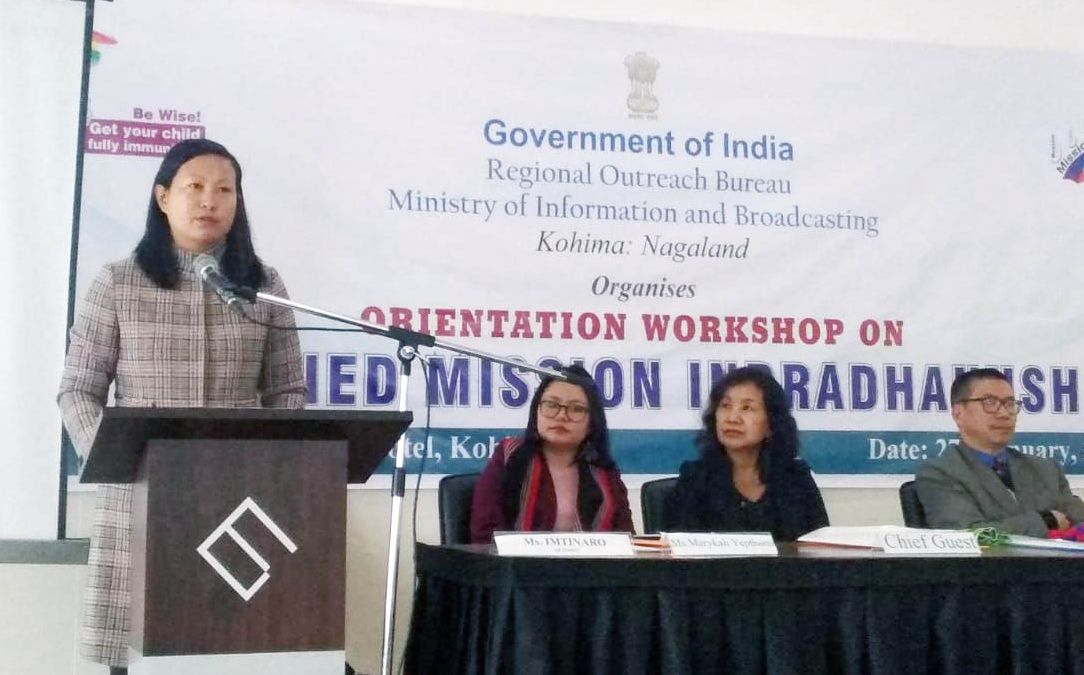Registered troupes from Nagaland and Manipur to carry message of IMI 2.0

Atono Tsükrü Kense speaking during the orientation workshop on Intensified Mission Indradhanush (IMI) 2.0 held at Eastgate Hotel, Kohima on January 27. (Morung Photo)
Morung Express News
Kohima | January 27
The orientation workshop on Intensified Mission Indradhanush (IMI) 2.0 was held at Eastgate Hotel, Kohima on January 27.
Organized by the Regional Outreach Bureau, Ministry of Information and Broadcasting, the workshop aims to train, engage and equip ten private registered troupes from Nagaland and Manipur to carry the message of IMI 2.0, to counter myths, address misconceptions and develop vaccine trust.
The troupes will be undertaking awareness generation program in eight identified districts in Nagaland namely Kiphire, Mon, Longleng, Tuensang, Zunheboto, Wokha, Peren and Phek. The event was graced by special guest Dr. Visasieü Kire, Medical Superintendent, Naga Hospital Authority Kohima and guest of honour, Atono Tsükrü Kense, Journalist and General Secretary, Kohima Press Club.
Speaking on the role of media in disseminating information towards promoting Health literacy, Atono Tsükrü Kense, journalist and general secretary, Kohima Press Club stated that the media has a huge responsibility towards the society for responsible journalism with credible information and reporting keeping in mind the ethics of journalism at the core.
“Our key role is to inform, criticize as well as create platforms for debates on various issues and concerns that are confronting our society,” said Kense.
For the journalist, the media is one of the most influential driving forces of modern society which not only provide sources of information but plays the role of the mediator between the government and its people, as well as a medium of learning to many.
Citing the Health System Strengthening- Conditionality Report of States 2018-19, where Nagaland was listed among four states who failed to meet the National Health Missions (NHM) criteria for immunization with only 47% coverage, Kense questioned the role of people working in the media. Media channels (print, electronic, social media etc) are a critical source of health information for the community, according to Kense, and we are the key players in disseminating information about immunization, especially those living in the rural and far-flung areas.
“Unfortunately, even today, in rural areas, many do not have access to proper and correct information and knowledge about the importance of immunization and vaccination. They have all kinds of apprehensions and misconceptions which hinder the process of development (by development, I mean health care facilities). We, as journalists are empowered with the tool where we can be the medium to facilitate, empower the population with correct information and encourage people’s participation in any development activities by providing information on the facilities and services that are available for them,” Kense pointed.
With the opportunity to interact with people at all levels, the need to use this to leverage and continue to raise one's voice and educate the people about health education was further highlighted.
“As our state is listed at the bottom on immunization coverage, we, as informed citizens must affect change both at personal and societal level by educating the people towards access and coverage of immunizations in the rural areas.
There is also the need for a sustained effort between the media and the health providers to achieve the policies and programme of the government,” remarked Kense. Special Guest Dr. Visasieü KireKire, Medical Superintendent, Naga Hospital Authority Kohima spoke on the history and objective of the National Immunization Program which was created in 1985. With the programmatic challenges confronting the program, Dr Kire informed that the IMI 2.0 was launched in 2019 to improve communication, strengthen universal immunization program and implement Intensified Mission Indradhanush. With the awareness generation program to be held in 8 districts in Nagaland, Dr. Kire express the hope that the community will be informed about the benefits of vaccinating the children and all fears, hesitancy and doubts removed from their minds.
The Universal immunisation program of India is one of the largest public health programs that protects children from ten vaccine preventable vaccine diseases free of cost and it is unfortunate that many of our children are unaware of the fact,” said Dr. Kire adding that the workshop will ensure the utilization of the UIP in order to deliver a healthy future of the children.
The resource persons for the workshop were Dr. Ritu Thur, Immunization Officer, Department of Health and Family Welfare and Marykali Yepthomi, Social and Behavioural Change Communication Consultant, UNICEF. Dr. Ritu Thur addressed the needs and issues of improving immunization coverage and highlighted the challenges of low immunization coverage in the State. With lack of awareness and a refusal to vaccine in several rural communities, Dr. Thur noted that low immunization coverage puts the entire community and area at risk of diseases.
The trained professional troops will be carrying out the campaign in innovative ways where they will mobilize the targeted audience through songs, dramas, dances, martial arts, magic tricks etc.



